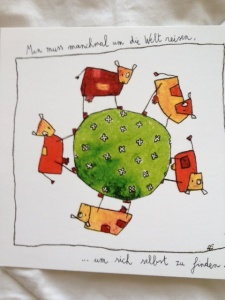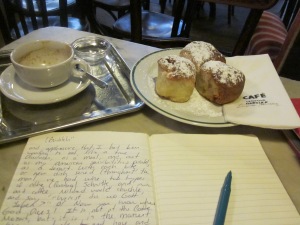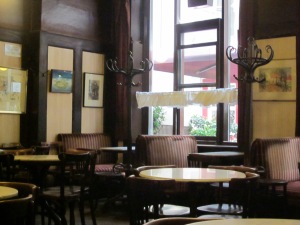Gentle Reader, it has been, I admit, some time. Given the current thematic trends in this blog, this does seem the most appropriate place to insert a Bronte-like, wistful paragraph about time, and nostalgia, and the moors (you get my drift). Instead though, I’ll insert a quote from a ridiculous card that I just found among my journals as I dug through my box of Vienna momentos here in my parent’s house in North Carolina.
“Man muss manchmal um die Welt reisen . . . um sich selbst zu finden.”
There certainly has been a lot of “selbst-findening” (pardon my Deutsch!) in the past year, but before I move forward to the next chapter, I would love to indulge in tellings of some of my Vienna good-byes.
My last Sunday with the Augustinerkirche gang is May 6. There is the same lovely pattern of bustle and confusion—everyone slathering great lumps of butter on bread while gulping back cups of coffee, instrumentalists and singers neck in neck in individual attempts to discover which of the silver carafes on the table had the most potential for a full cup. Mildred, just as on my very first morning, shoving people out of her way while serving up hard-boiled egg, ham and cheese refills on the large white platters sitting on the food table.
We sing wonderful stuff–the text of the Credo is spat out over the orchestra by the choir into the crowd below. A teacher told me once that singing with an orchestra is like flying, and especially here I feel it, perched in the choir loft on riser-like seating over the orchestra, a sense of internal motion and rhythm present within each individual as we soar through Rieder’s impossibly cheerful Mass in C Major.
I’m glad nothing is different today, the last Sunday. Francine is shh-ing everyone in the choir who is talking, Mildred gives me a huge pile of photocopies of Winerlied, I eat too much cake at coffee time, Y– helps me out with my German, Mildred, done with her repertoire distribution, reads a trashy magazine, and Elmo, our impossibly tan, slicked-back-raven-haired organist sits attentively at his post.
In an odd sort of coincidence, we finish the mass by singing John Rutter’s “A Gaelic Blessing”—the first time we have sung anything in English. I sing, and breathe thanks to this world, these people, this time.
Deep peace of the running wave to you/Deep peace of the flowing air to you/Deep peace of the quiet earth to you/Deep peace of the shining stars to you/Deep peace of the gentle night to you/Moon and stars, pour their healing light on you/Deep peace of Christ, the light of the world to you.
My last melange is at the Cafe Hawelka on the morning of May 7.
Embarrassingly true to form, and perhaps indicative of my graduate school days, I have shown up so early that the cafe, although technically open, is still only half lit, with the famous “Büchteln” still baking for another half hour. The cafe’s only other occupant, a guy a few years older than me, wearing a stocking cap and sitting at a large faded velvet upholstered booth by the window turned down the waiter’s offer of an 8 AM Sacher Torte, as nothing else is ready yet.
It seems fitting to continue my week of lasts here, sitting at one of my favorite tiny tables, as the waiters count out the cash drawer, and get ready for the day. It strikes me as quite appropriate that even the cafes change in the spring–the doors are left open to let in the fresh air, and the green of the shrubbery outside peeks in a friendly hello through windows with shades fully lifted. As I sit and wait, I think back upon Mildred’s musings yesterday on the power of a cafe. My friend Kelley was finishing up her visit to Wien, and Mildred had kindly offered to take both of us out on my last sunday in Vienna.
“It doesn’t matter how weary you are,” Mildred began with her forcible, lilting accent, as we sat at the Cafe Mozart. “You come in here and–” she lifted her hands as if in supplication–“after twenty minutes you are energized—you are alive! What I want you to watch is the way the waiter” –here she paused again to make another dramatic gesture–“the way he is so practiced, he is so professional. It is not something one learns in two months!” At this, our waiter, grey haired, suited, and (clearly) practiced, returned to the table with a “Bitte schön?” Mildred placed our (first) order, and after an animated discussion of which wine we should have, the waiter inclined his head, and disappeared. “You see–” Mildred said, bowing her head in the same studied manner as the waiter, “Just so.”
Mildred started the meal with a glass of beer (as I ALWAYS do, of course, Gentle reader), and continued to dig into “her” lamb, as she had posessively been calling it since our evening together several weeks ago at the opera. Kelley had Tapfelstpitz–a soupy, tender beef, served with horseradish, applesauce, a lovely half moon of mounded fried potatoes, and some vegetables. I had Kaiserschmarr’n, a ridiculously sweet, torn pancake with plum sauce and applesauce that I had been wanting eat, like a true Austrian, at a meal, and not, as my American sensibilities pointed, as a dessert. With each bite or new dish served (throughout the meal we had wine, two types of cake–Cardinal Schnitte, and a seasonal cake, and coffee), Mildred would chuckle and say “Weißt du wo Gott wohnt?” —or Do you know where God lives? She would then answer herself, robustly saying, “It is not at the Cafe Mozart, but it IS in the moment when you taste and have and experience these things!”
Kelley and I smiled at one another, feeling equally fortunate, I believe, to be on this woman’s list of people deserving of her time and affection.
After our capable waiter brought the cake, Mildred sat back, sipping her Großer Brauner, and gestured dramatically. “You see!” she said “This is why we in Austria talk about gemütlichkeit—that is, what it is! This, this is gemütlichkeit!” Kelley asked Mildred to explain a bit more of what she meant. “Gemütlichkeit,” Mildred continued, “is the appreciation of good food, of good living, the simplicity of a good life. You see, in the war, things were not so easy. We did not often have food to eat!” At this Mildred grins, somehow offsetting the unease that I begin to feel. Going on, she describes waiting in lines for potatoes after the war, waiting all day. “It was so funny you see, because as I waited and waited, the person just ahead of me in line got the last potato! Funny no? But of course, now I eat my lamb. I have seen a lot.” Kelley and I make small comments of surprise, but stay quiet, wanting to hear more. “There was another time, it was just after the war. We had no food, and there were convoys going to another village outside of Vienna that had food. I was the youngest, and my mother told me that I should go and ride out with the rest to get food. We woke up so early, it was still dark when we left. We rode on top of the trucks and waited and waited on the road for hours until finally we were allowed to pass. It was such a wonderful, funny day. Can you imagine, waiting so many hours just to pass!” (Kelley and I later agreed that this woman certainly deserved to eat as many types of cake and drink several varieties of alcohol at lunch whenever she pleased!)
Mildred generously paid the bill, and we stepped out into the early May sunshine. She trundled about, giving us a brief “tour” of various parts of the Burggarten on the way to her bus stop. On the way, I swooned over her anecdote about seeing Maria Callas in Lucia di Lammermoor at the Staatsoper. “I waited in line for seven hours!” she explained confidentially–“Of course, it was the only thing to do. Imagine, to see Callas!”
Of course this morning, at Cafe Hawelka, I am sans Mildred and Kelley. I sit and wait for the browning Büchteln to be done, and think of other days and company at Hawelka. As I’m sure I’ve mentioned before (and if not, what I’m sure Mildred has made pretty clear), for the Viennese, a cafe represents a place oddly at the crossroads between private and public. In my time in this beautiful city, I think this has certainly been the case. Cafes have been both my refuge from the VT’s as well as a quick way to feel a part of Viennese culture. I quickly adopted the melange (a sweet, milky coffee) as my “order,” although dwindling funds necessitated the Kleiner brauner (slightly sweet espresso, which I have since attempted to recreate and categorized as a ristretto shot here in the states) to be my typical drink of choice for the majority of my time here. It has been here, at Hawelka that I have attempted to quantify and understand my purpose in Wien, making countless lists and writing letters to myself about goals. The Büchteln arrive, interrupting my reverie. Unable to wait, I pull apart one roll, and shove a rich, plummy hot piece into my mouth, feeling a bit like Hänsel or Gretel at the witch’s house. I am rewarded for my lack of restraint with a burnt tongue, and the taste of surprisingly savory fresh bread folded over the dark, fruity filling; flecks of powdered sugar drop onto my scarf. Why is Vienna such a painfully tasty city? Gemütlichkeit indeed.
As I pay for my breakfast, I mention to the waiter that I have lived in the city for the past few months, and that this is my last visit to Hawelka. I say that the cafe has felt like a home, and how grateful I am for their hospitality. Smiling, he brings Leopold Hawelka’s son forward (Leopold Hawelka died at age 100, three days before I arrived in Vienna in January). His face is lined from many years of smiles. I thank him in my typical, awkward Deutsch, and he shakes my hand, with a kind “Gute Reise.”
More farewell-recollections to come, but for now, so long, farewell, and so on.



I got a bit teary reading that…visiting you in Vienna and meeting the amazing women you befriended was one of the best vacations I’ve ever had, and that’s saying an awful lot! I miss Vienna and was only there for what, 5 days?
I completely understand—your visit was one of MY favorite vacations I’ve ever had . . . and that was despite the pieces of plastic being slowly put up over my windows. We’ll certainly have to go back and visit Schwester Christine. 🙂